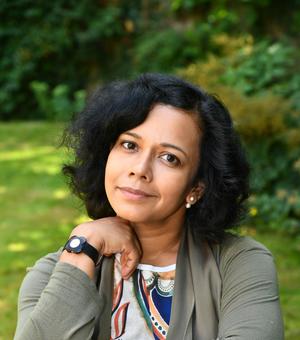Professor Nandini Das
I work on early modern literature, prose-fiction (chivalric romance, in particular), travel, migration, and cross-cultural encounters, and have published widely on these topics, from their appearance in the writings of major sixteenth and seventeenth century authors such as Philip Sidney, Shakespeare and Cervantes, to the fleeting presence of three Japanese boys in sixteenth century Portuguese-held Goa, India. In 2007, my first publication in this field was a scholarly edition of Robert Greene’s Planetomachia. This edition explored the ways in which a sixteenth century popular English writer’s exposure to European scientific and narrative developments led to a radically new form of fiction. A major discovery in this edition was the identification and translation of Greene’s previously unknown Latin sources, which threw new light on the ways in which continental neo-Platonic thought and texts were used by the 1590s generation of university-educated professional writers like Greene. Subsequently, in Renaissance Romance: The Transformation of English Prose Fiction, 1570-1620 (2011), I continued to explore the substantial interfaces between continental European and English developments in prose fiction, and the role that generational conflict and travel played in the process.
The focus on travel, across different historical periods, languages, and cultures, continues in The Cambridge History of Travel Writing (2019), which I co-edited with Tim Youngs. More recently, as project director for the major European Research Council funded ‘Travel, Transculturality and Identity in Early Modern England’ (ERC-TIDE) project, I co-wrote and edited Keywords of Identity and Lives in Transit, both of which explore the development of fundamental English concepts about identity, race, and belonging, and the lives they touched, through forced and voluntary mobility. Those interests also fuel two of my ongoing projects: I am volume editor of Elizabethan Levant Trade and South Asia in the forthcoming Oxford edition of Richard Hakluyt’s Principal Navigations (1598-1600), and editor of the forthcoming Oxford Handbook of Travel, Race and Identity in Early Modern England.
I also have a continuing interest in digital humanities, which stems from an early industry-based stint outside academic research, when I was involved in software development and the design and implementation of complex knowledge management systems. I am on the Digital Scholarship@Oxford (DiSc) Steering Committee, and many of the research projects in which I have been involved have had a significant digital element. A recent DPhil project I supervised used network analysis to investigate information transmission in early modern English travel writing, for instance, while my European Research Council funded ERC-TRACTION project produced an open access, self-directed training platform for school teachers who wanted to engage with the policy work and research undertaken by ERC-TIDE, and won a Vice Chancellor's Innovation and Engagement award in 2022.
Much of my work has been supported by external funding from the UK Arts and Humanities Research Council (AHRC), the Leverhulme Trust, the UK India Education & Research Initiative (UKIERI), and the European Research Council. My most recent book, Courting India: England, Mughal India, and the Origins of Empire, about the first English embassy to India, received the 2023 British Academy Book Prize for Global Cultural Understanding, and I am currently completing a new history of Tudor and Stuart England, written from the perspective of those moving in and out of the country, provisionally titled This Little World.
Sharing my research with audiences both in academic settings and at literature and cultural festivals is a significant part of my work. I began presenting on radio as a BBC New Generation Thinker over a decade ago, and continue to present television and radio programmes regularly on my research, and on wider questions of higher education policy.
Undergraduate teaching: I teach widely across the sixteenth and seventeenth centuries, which, in Oxford terms, means Final Honours School papers 1 (Shakespeare), 3 (1550-1660) and 4 (1660-1760). I sometimes offer an option on early modern travel writing, and lectures on the Classics and English lecture series. I also supervise a wide range of undergraduate dissertations on topics ranging from insects in early modern literature, to the use of stage makeup for non-white characters on the Shakespearean stage.
Graduate teaching: I sometimes co-convene the MSt 1550-1700 course, and teach the A-course (methodology and approaches). In other years, I may offer C-courses on travel and early modern discourses around identity and belonging. Supervising Master's dissertations is a constant either way, with recent dissertations on early modern Turk plays and the prose fiction of Lady Mary Wroth developing subsequently into doctoral projects and journal publications.
DPhil supervision: My students have worked on a wide range of topics, from doctoral theses on sea imagery in early modern English literature and on Richard Hakluyt's Principal Navigations, to Renaissance arts of memory and the influence of commedia dell'arte on early modern English culture. I am always keen to hear from prospective graduate students who want to work on sixteenth and seventeenth century literature or cultural history, and particularly on prose fiction, drama, travel writing and cross-cultural encounters, and early modern conceptions of race and belonging.
I am a long-standing reviewer and panellist for a number of national and international research councils and funding bodies. A founding member of UKRI Research England Council (2016-2022) and a current member of the UK Committee on Research Integrity, I am involved in work within national and international research communities across multiple areas, including research assessment frameworks, Open Access, equality and diversity, research integrity, and research funding.
I serve as a Vice President of the Hakluyt Society, and on the Council of the UK Society of Renaissance Studies, as well as a number of Advisory and Editorial Boards.
You can find me -- occasionally -- on social media as @rentravailer.




